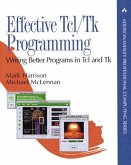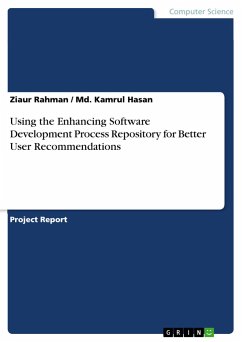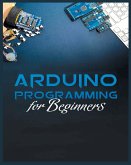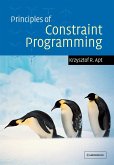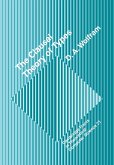Kent Beck
Kent Beck's Guide to Better Smalltalk
Kent Beck
Kent Beck's Guide to Better Smalltalk
- Broschiertes Buch
- Merkliste
- Auf die Merkliste
- Bewerten Bewerten
- Teilen
- Produkt teilen
- Produkterinnerung
- Produkterinnerung
Written for Smalltalk programmers, this book is designed to help readers become more effective Smalltalk developers and object technology users.
Andere Kunden interessierten sich auch für
![Effective Tcl/TK Programming: Writing Better Programs with TCL and TK Effective Tcl/TK Programming: Writing Better Programs with TCL and TK]() Mark HarrisonEffective Tcl/TK Programming: Writing Better Programs with TCL and TK53,99 €
Mark HarrisonEffective Tcl/TK Programming: Writing Better Programs with TCL and TK53,99 €![Pharo with Style Pharo with Style]() Stéphane DucassePharo with Style5,99 €
Stéphane DucassePharo with Style5,99 €![Pharo 9 by example Pharo 9 by example]() Stéphane DucassePharo 9 by example14,99 €
Stéphane DucassePharo 9 by example14,99 €![Using the Enhancing Software Development Process Repository for Better User Recommendations Using the Enhancing Software Development Process Repository for Better User Recommendations]() Ziaur RahmanUsing the Enhancing Software Development Process Repository for Better User Recommendations15,95 €
Ziaur RahmanUsing the Enhancing Software Development Process Repository for Better User Recommendations15,95 €![The Complete Guide to Arduino Programming The Complete Guide to Arduino Programming]() Michael StoneThe Complete Guide to Arduino Programming28,99 €
Michael StoneThe Complete Guide to Arduino Programming28,99 €![Principles of Constraint Programming Principles of Constraint Programming]() Krzysztof AptPrinciples of Constraint Programming58,99 €
Krzysztof AptPrinciples of Constraint Programming58,99 €![The Clausal Theory of Types The Clausal Theory of Types]() D. A. WolframThe Clausal Theory of Types35,99 €
D. A. WolframThe Clausal Theory of Types35,99 €-
-
-
Written for Smalltalk programmers, this book is designed to help readers become more effective Smalltalk developers and object technology users.
Hinweis: Dieser Artikel kann nur an eine deutsche Lieferadresse ausgeliefert werden.
Hinweis: Dieser Artikel kann nur an eine deutsche Lieferadresse ausgeliefert werden.
Produktdetails
- Produktdetails
- Verlag: Cambridge University Press
- Seitenzahl: 428
- Erscheinungstermin: 16. Januar 2015
- Englisch
- Abmessung: 229mm x 152mm x 23mm
- Gewicht: 616g
- ISBN-13: 9780521644372
- ISBN-10: 0521644372
- Artikelnr.: 22271483
- Herstellerkennzeichnung
- Libri GmbH
- Europaallee 1
- 36244 Bad Hersfeld
- gpsr@libri.de
- Verlag: Cambridge University Press
- Seitenzahl: 428
- Erscheinungstermin: 16. Januar 2015
- Englisch
- Abmessung: 229mm x 152mm x 23mm
- Gewicht: 616g
- ISBN-13: 9780521644372
- ISBN-10: 0521644372
- Artikelnr.: 22271483
- Herstellerkennzeichnung
- Libri GmbH
- Europaallee 1
- 36244 Bad Hersfeld
- gpsr@libri.de
1. Foreword
2. Preface
3. Introduction
Part I. The Smalltalk Report: 4. Why study Smalltalk idioms?
5. The dreaded super
6. Abstract control idioms
7. ValueModel idioms
8. Collection idioms: standard classes
9. An Objectworks/Smalltalk 4.1 wrapper idiom
10. A short introduction to pattern language
11. Instance-specific behavior: how and why
12. Instance-specific behavior: Digitalk implementation and the deeper meaning of it all
13. To accessor or not to accessor?
14. Inheritance: the rest of the story
15. Helper methods avoid unwanted inheritance
16. It's not just the case
17. Where do objects come from? Part 2
18. Where do objects come from? from variables and methods
19. Birds, bees, and browsers - obvious sources of objects
20. Using patterns: design
21. Simple Smalltalk testing
22. Architectural prototype: television remote control
23. Demand loading for Visual Works
24. Garbage collection revealed
25. What? what happened to garbage collection
26. Super +1
27. Clean code: pipe dream or state of mind?
28. A modest meta proposal
29. Use of variables: temps
30. Variables of the world
31. Farewell and a wood pile
Part II. Object Magazine: 32. Development environments
33. Whole lotta Smalltalk: the technology
34. CRC: finding objects the easy way
35. Distributed Smalltalk
36. Patterns 101
Part III. JOOP: 36. Constructing abstractions for object-oriented applications
Part IV. Other papers: 37. A diagram for OO programs, OOPSLA 1986
38. A laboratory for teaching OO thinking, OOPSLA '89
39. Playground: a programming language for children of all ages, OOPSLA '89
40. Think like an object, UNIX Review, Oct. 1991
41. Writing more valuable objects with patterns, Dr. Dobbs, Feb 1993.
2. Preface
3. Introduction
Part I. The Smalltalk Report: 4. Why study Smalltalk idioms?
5. The dreaded super
6. Abstract control idioms
7. ValueModel idioms
8. Collection idioms: standard classes
9. An Objectworks/Smalltalk 4.1 wrapper idiom
10. A short introduction to pattern language
11. Instance-specific behavior: how and why
12. Instance-specific behavior: Digitalk implementation and the deeper meaning of it all
13. To accessor or not to accessor?
14. Inheritance: the rest of the story
15. Helper methods avoid unwanted inheritance
16. It's not just the case
17. Where do objects come from? Part 2
18. Where do objects come from? from variables and methods
19. Birds, bees, and browsers - obvious sources of objects
20. Using patterns: design
21. Simple Smalltalk testing
22. Architectural prototype: television remote control
23. Demand loading for Visual Works
24. Garbage collection revealed
25. What? what happened to garbage collection
26. Super +1
27. Clean code: pipe dream or state of mind?
28. A modest meta proposal
29. Use of variables: temps
30. Variables of the world
31. Farewell and a wood pile
Part II. Object Magazine: 32. Development environments
33. Whole lotta Smalltalk: the technology
34. CRC: finding objects the easy way
35. Distributed Smalltalk
36. Patterns 101
Part III. JOOP: 36. Constructing abstractions for object-oriented applications
Part IV. Other papers: 37. A diagram for OO programs, OOPSLA 1986
38. A laboratory for teaching OO thinking, OOPSLA '89
39. Playground: a programming language for children of all ages, OOPSLA '89
40. Think like an object, UNIX Review, Oct. 1991
41. Writing more valuable objects with patterns, Dr. Dobbs, Feb 1993.
1. Foreword
2. Preface
3. Introduction
Part I. The Smalltalk Report: 4. Why study Smalltalk idioms?
5. The dreaded super
6. Abstract control idioms
7. ValueModel idioms
8. Collection idioms: standard classes
9. An Objectworks/Smalltalk 4.1 wrapper idiom
10. A short introduction to pattern language
11. Instance-specific behavior: how and why
12. Instance-specific behavior: Digitalk implementation and the deeper meaning of it all
13. To accessor or not to accessor?
14. Inheritance: the rest of the story
15. Helper methods avoid unwanted inheritance
16. It's not just the case
17. Where do objects come from? Part 2
18. Where do objects come from? from variables and methods
19. Birds, bees, and browsers - obvious sources of objects
20. Using patterns: design
21. Simple Smalltalk testing
22. Architectural prototype: television remote control
23. Demand loading for Visual Works
24. Garbage collection revealed
25. What? what happened to garbage collection
26. Super +1
27. Clean code: pipe dream or state of mind?
28. A modest meta proposal
29. Use of variables: temps
30. Variables of the world
31. Farewell and a wood pile
Part II. Object Magazine: 32. Development environments
33. Whole lotta Smalltalk: the technology
34. CRC: finding objects the easy way
35. Distributed Smalltalk
36. Patterns 101
Part III. JOOP: 36. Constructing abstractions for object-oriented applications
Part IV. Other papers: 37. A diagram for OO programs, OOPSLA 1986
38. A laboratory for teaching OO thinking, OOPSLA '89
39. Playground: a programming language for children of all ages, OOPSLA '89
40. Think like an object, UNIX Review, Oct. 1991
41. Writing more valuable objects with patterns, Dr. Dobbs, Feb 1993.
2. Preface
3. Introduction
Part I. The Smalltalk Report: 4. Why study Smalltalk idioms?
5. The dreaded super
6. Abstract control idioms
7. ValueModel idioms
8. Collection idioms: standard classes
9. An Objectworks/Smalltalk 4.1 wrapper idiom
10. A short introduction to pattern language
11. Instance-specific behavior: how and why
12. Instance-specific behavior: Digitalk implementation and the deeper meaning of it all
13. To accessor or not to accessor?
14. Inheritance: the rest of the story
15. Helper methods avoid unwanted inheritance
16. It's not just the case
17. Where do objects come from? Part 2
18. Where do objects come from? from variables and methods
19. Birds, bees, and browsers - obvious sources of objects
20. Using patterns: design
21. Simple Smalltalk testing
22. Architectural prototype: television remote control
23. Demand loading for Visual Works
24. Garbage collection revealed
25. What? what happened to garbage collection
26. Super +1
27. Clean code: pipe dream or state of mind?
28. A modest meta proposal
29. Use of variables: temps
30. Variables of the world
31. Farewell and a wood pile
Part II. Object Magazine: 32. Development environments
33. Whole lotta Smalltalk: the technology
34. CRC: finding objects the easy way
35. Distributed Smalltalk
36. Patterns 101
Part III. JOOP: 36. Constructing abstractions for object-oriented applications
Part IV. Other papers: 37. A diagram for OO programs, OOPSLA 1986
38. A laboratory for teaching OO thinking, OOPSLA '89
39. Playground: a programming language for children of all ages, OOPSLA '89
40. Think like an object, UNIX Review, Oct. 1991
41. Writing more valuable objects with patterns, Dr. Dobbs, Feb 1993.


